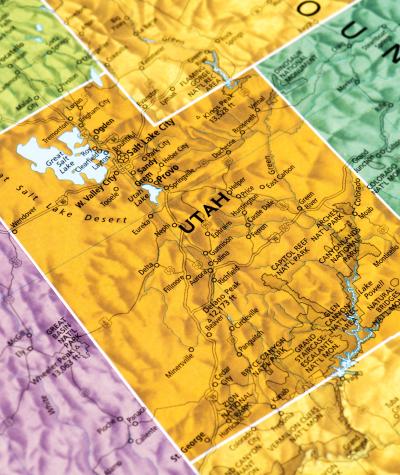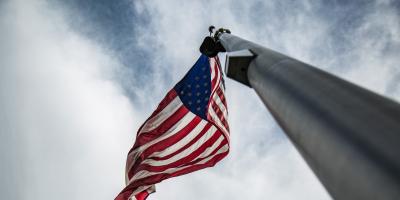For almost a decade, Utahns have been fighting for fair voting maps and fair representation. Yet, every time Utah voters score a victory in this fight, a new hurdle materializes that prevents these efforts from moving forward in time for the next election.
As we get closer to the 2026 midterm elections, Campaign Legal Center (CLC) is continuing to fight on behalf of our clients and Utah voters to get these legal efforts over the finish line.
How Did We Get Here?
In 2018, Utahns voted to pass Proposition 4, a ballot initiative that established the Utah Independent Redistricting Commission and included a set of neutral criteria that all redistricting maps in Utah must follow. Proposition 4 also banned partisan gerrymandering.
Despite this voter-led victory, in 2020, the Utah Legislature overruled the will of voters by repealing Proposition 4 and passing its own gerrymandered map.
So, Campaign Legal Center, on behalf of the League of Women Voters of Utah (LWVUT), Mormon Women for Ethical Government (MWEG), and several individual voters, sued to reinstate Proposition 4 and challenge the unfair map.
Advocating for a Fair Map in State Court
Following a series of court rulings and multiple victories for Campaign Legal Center and our clients LWVUT and MWEG, on August 25, 2025, Utah’s Third District Court ruled that the Legislature violated the Utah Constitution when it repealed Proposition 4.
Because of this unconstitutional repeal, the district court ruled that Proposition 4 was once again the law in Utah, and a new congressional map had to be drawn to comply.
In response, the Legislature passed a new map, Map C, along with a companion bill that changed Proposition 4 to reverse-engineer standards that would require partisan gerrymanders.
After a two-day evidentiary hearing, on November 10, 2025, the district court blocked Map C because it was drawn using partisan data, was a partisan gerrymander, and failed to comply with Proposition 4’s neutral criteria.
The court also blocked the companion bill for unconstitutionally impairing Proposition 4. To ensure a legal map was in place in time for the 2026 election, the court put in place Map 1, which was proposed by the plaintiffs and complied with all of Proposition 4’s requirements.
In January 2026, the Legislature filed an appeal to the Utah Supreme Court seeking to reverse the district court’s August 2025 order that resurrected Proposition 4 and enjoined the 2021 map. On February 20, 2026, the court dismissed the Legislature's appeal, once again securing fair maps for Utahns.
As aspects of the case continue in state district court, the Utah Legislature passed a new law allowing state defendants a unilateral and unreviewable right to transfer any case from the district court to a newly created panel of three judges.
This violates numerous provisions of the Utah Constitution, and the plaintiffs have filed a supplemental complaint and preliminary injunction motion challenging this latest effort by the Legislature to unfairly control the litigation.
Defending a Fair Map in Federal Court
A group of plaintiffs including U.S. Representatives Celeste Maloy and Burgess Owens and several local elected officials filed a new lawsuit on February 2, 2026, in federal district court.
They claimed that the new, fair map was enacted in violation of the federal elections clause. Their arguments that a redistricting plan is not subject to normal review by state courts relied on a dangerous concept called the independent state legislature theory, which was resoundingly rejected by the U.S. Supreme Court in 2023.
After years of fighting attempts by the Utah State Legislature to undermine the will of the voters, allies of the Legislature went to federal court in yet another attempt to keep in place an extreme partisan gerrymander.
The plaintiffs in this new case wanted to prevent the fair map from being used and advocated for a return to the 2021 map that the state court already ruled violated the Utah Constitution and Proposition 4.
So, Campaign Legal Center, on behalf of our clients LWVUT, MWEG and individual Utahns, filed a motion to intervene in this federal case as defendants, seeking to dismiss the case and defend Utahns’ rights to a fair and legal map.
Under the federal election clause, redistricting must be done in compliance with the laws of the state, and when necessary, a state court has the authority and obligation to impose a new map, which is exactly what happened in the state court case.
On February 23, 2026, the court ruled that the judge in the state case had the power to impose a fair map for voters and because Utah has entered into an active primary campaign, it is too late in the election process to change the map for 2026.
What's Next?
Campaign Legal Center will continue its fight in ensuring that all voters can make their voices heard, and we will continue to advocate for Congress to pass a nationwide solution prohibiting partisan gerrymandering and mandating fair congressional districts in all states.
Support us as we continue our work to ensure that all Americans can vote under fair maps.



